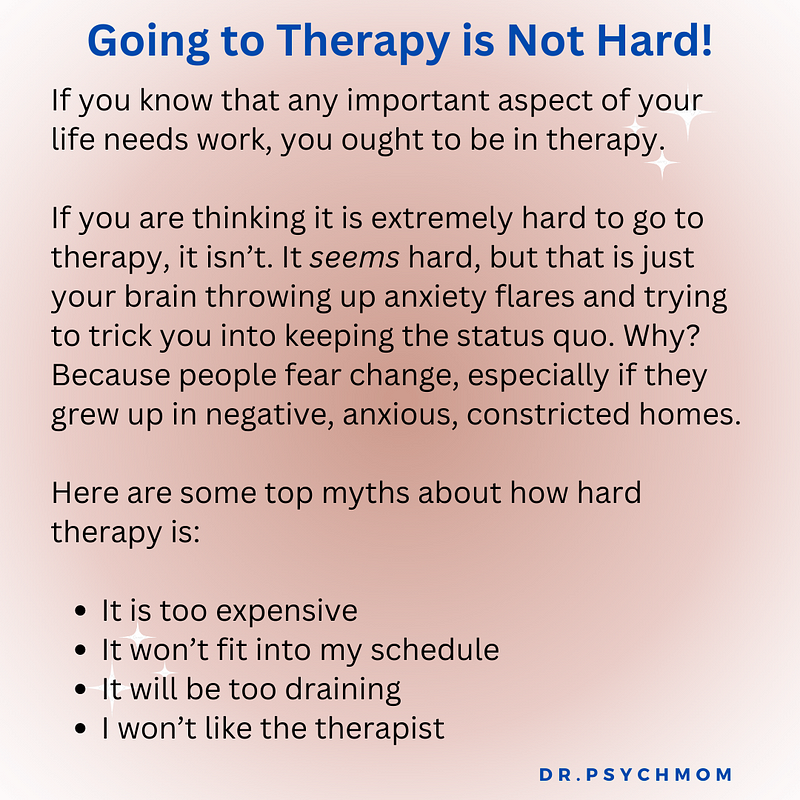Finding Therapy More Accessible Than You Might Think
Written on
Understanding the Ease of Seeking Therapy
In my podcast focused on Adult Children of Dysfunctional Families, I emphasize that while starting therapy can seem daunting, particularly with the advent of teletherapy, the actual process of attending therapy is quite manageable. This message is for those who engage with my content but feel hesitant or anxious about embarking on their own therapeutic journey.

If you recognize that critical areas of your life—like your relationships, parenting skills, job performance, or personal happiness—require attention, and if you are already inclined towards psychology by following my blog, seeking therapy is a wise choice. You may perceive it as an overwhelming task, yet this perception is often a product of your mind creating anxiety to keep you in your comfort zone. Why is this? Change can be intimidating, especially for those raised in stressful or restrictive environments.
Why the Fear of Therapy?
Let’s address common misconceptions about the challenges of therapy one by one.
- It’s Too Expensive: Therapy may not be as costly as you think. Many universities, such as the University of Maryland, offer therapy through training clinics where doctoral students provide sessions under licensed supervision, often for a nominal fee. Search for similar clinics in your vicinity by looking for “clinical psychology PhD or PsyD programs near me.” If you have insurance, platforms like PsychologyToday.com can help you locate therapists who accept your plan. Additionally, even if you opt for a self-pay practice, you may be eligible to submit superbills to your insurer for reimbursement.
- Scheduling Conflicts: Teletherapy eliminates the need for commuting and allows for flexibility. You can participate in sessions from your car or during convenient hours, whether early morning or late at night. Therapists often have varied schedules to accommodate clients. Personally, I find teletherapy to be incredibly convenient for both therapists and clients.
- Emotional Drain: The concern that therapy might leave you too exhausted to engage in daily activities is largely unfounded. Most clients manage their lives—work, family, and social obligations—effectively alongside therapy. Even if you experience emotional moments during sessions, you will still return to your daily routine afterward, as resilience is a fundamental human trait.
- Disliking the Therapist: If you fear not liking your therapist, this may reflect your own negative outlook, which is precisely what therapy can help address. Contrary to popular belief, therapists are generally approachable and supportive. If you worry that your therapist won’t be intellectually stimulating enough, consider that your self-doubt could indicate a deeper issue that therapy can help resolve.
While I won’t pretend that engaging in therapy is without its challenges, the initial steps—reaching out to a provider, completing necessary forms, and scheduling your sessions—are far simpler than many everyday tasks. The potential for significant, lasting improvement in your life is worth the effort. You deserve this opportunity, and if you’re a parent, your children certainly benefit from your growth as well.
For a glimpse into what therapy with me entails, you might find it less intimidating than the paperwork required for your child's school enrollment or the demands of your job. Seeking therapy is far easier than living with anxiety, depression, unresolved trauma, or self-doubt. Today, you can choose to use this post as a catalyst to seek the help you deserve. Until next time, remember that therapy is a more manageable path to happiness.
For therapy, connect with Dr. Whiten and explore her group practice, Best Life Behavioral Health. Interested in coaching? Visit Dr. Whiten's coaching services. Don't forget to check out her books, including 52 Emails to Transform Your Marriage and How to Talk to Your Kids about Your Divorce, and listen to The Dr. Psych Mom Show on your favorite podcast platform. Join the Dr. Psych Mom secret Facebook group for more discussions on these topics!
Please note: This blog is not intended as medical advice or diagnosis and should not substitute for professional consultation. If you try this advice and it doesn’t yield results, you cannot hold me liable. The opinions expressed here are based on my experience as a therapist. All client examples are hypothetical amalgamations and not real individuals.
Chapter 2 Title
The second video focuses on the journey of becoming a therapist, providing valuable insights for aspiring professionals. This discussion can illuminate the path to therapy, emphasizing how accessible and rewarding the process can be.